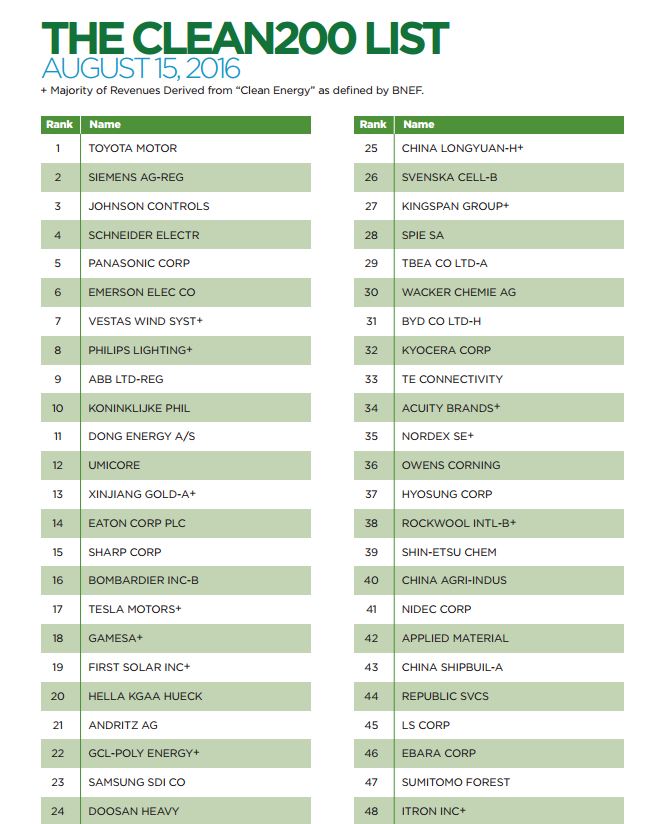As You Sow and Corporate Knights today released the inaugural version of the Carbon Clean 200TM (Clean200TM), a list of 200 clean energy companies showing a simulated annualized return of 21.82% over the past decade. The list will be updated quarterly to serve as the inverse of the Carbon Underground 200TM, a list of fossil fuel companies being targeted for divestment, which generated a 7.84% annualized return over the same time period.
“The Clean200 nearly tripled the performance of its fossil fuel reserve-heavy counterpart over the past ten years, showing that clean energy companies are providing concrete and measurable rewards to investors,” said Toby Heaps, CEO of Corporate Knights and report co-author. “What’s more, the outstanding performance of this list shows that the notion that investors must sacrifice returns when investing in clean energy is outdated. Many clean energy investments are profitable now, and we anticipate that over the long-term their appeal will only go up as technologies improve and more investors move away from underperforming fossil fuel companies.”
The 21.82% return was due in large part to significant exposure to Chinese clean energy companies which have experienced explosive growth. The returns of the Clean200 ex-China were lower, but still superior to the S&P 1200 global benchmark and Carbon Underground 200.
The Clean200 ranks the largest publicly listed companies worldwide by their total clean energy revenues as rated by Bloomberg New Energy Finance (BNEF). In order to be eligible, a company must have a market capitalization greater than $1 billion (end of Q2 2016) and earn more than 10% of total revenues from clean energy sources. Over 70 of the companies on the list receive a majority of their revenue from clean energy. The list excludes all oil and gas companies and utilities that generate less than 50% of their power from renewable sources, as well as the top 100 coal companies measured by reserves. The list also filters out companies profiting from weapons manufacturing, tropical deforestation, the use of child and/or forced labor, and companies that engage in negative climate lobbying.
“Our intention with The Clean200 is to begin a conversation that defines what companies will be part of the clean energy future,” said Andrew Behar, CEO of As You Sow and the report’s co-author.
“The Clean200 turns the ‘carbon bubble’ inside out. The list is far from perfect, but begins to show how it’s possible to accelerate and capitalize on the greatest energy transition since the industrial revolution.”
The performance analysis for each of the three lists is based on a ‘snapshot in time’ analysis of current constituents as the BNEF clean energy revenue exposure database is new and does not go back in time. The analysis also introduces a survivorship bias that can be present when stocks which do not currently exist (because they have failed, for example) are excluded from the historical analysis. This bias can result in the overestimation of past returns.
The methodology and list used to develop the Clean200 are in the creative commons and can be downloaded at www.clean200.org.

The top 10 Clean200 companies with a majority of their revenue from clean energy include Vestas (wind power), Philips Lighting (LED lighting), Xinjiang Gold-A (wind plants), Tesla Motors (electric vehicles), Gamesa (wind turbines), First Solar (solar modules), GCL-Poly Energy (solar grade polysilicon), China Longyuan-H (wind Farms), Kingspan Group (Insulation and building envelopes), and Acuity Brands (LED lights).



